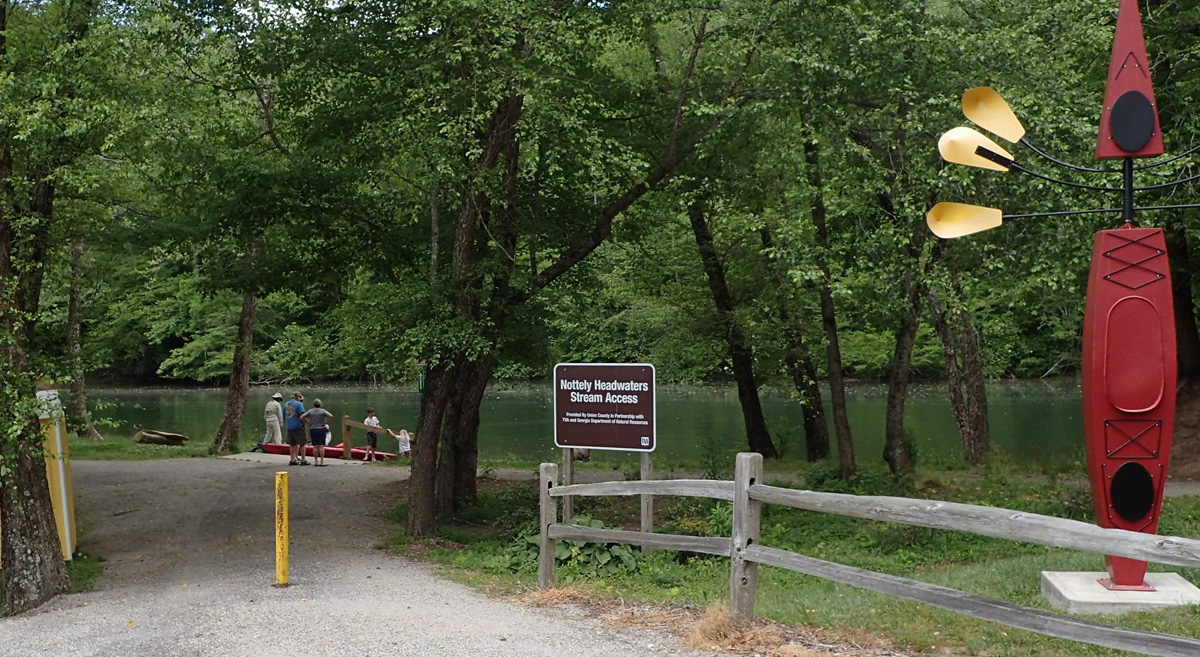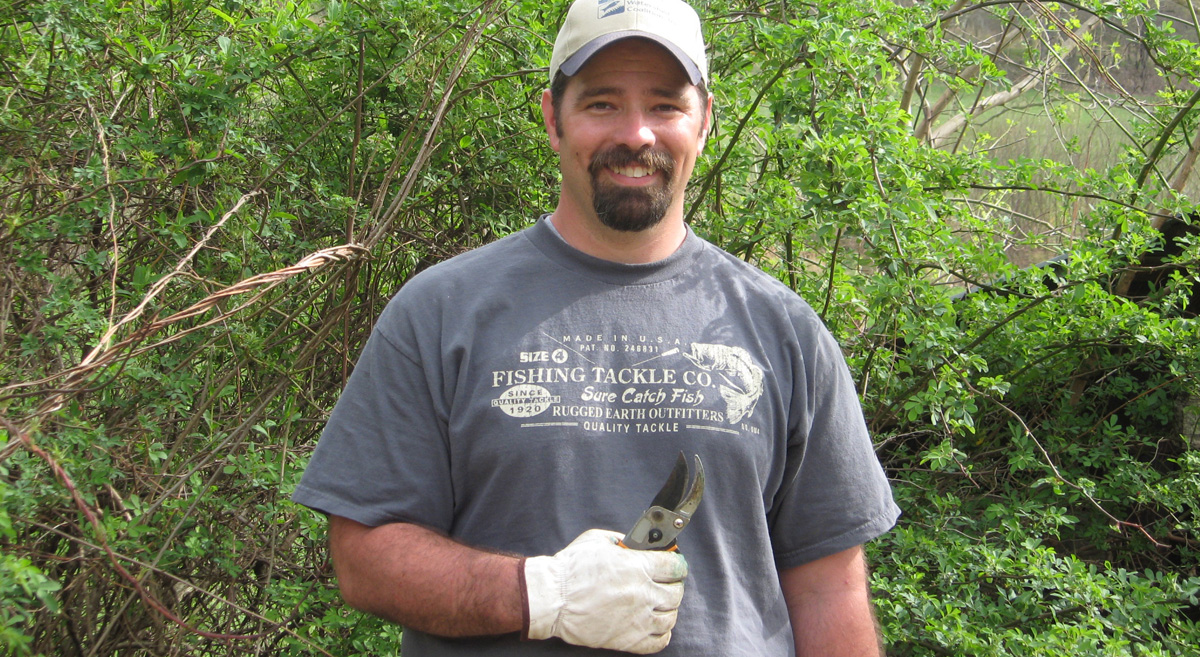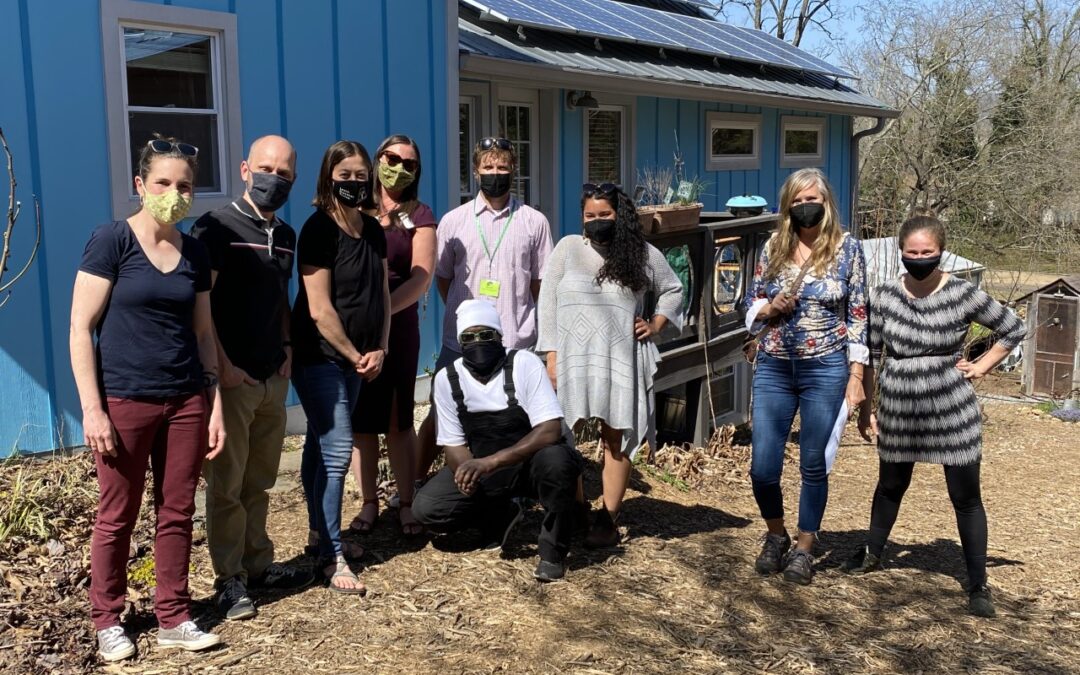
‘Energy Solutions’ Bill Sets North Carolina on Path to Carbon Neutrality by 2050
‘Energy Solutions’ Bill Sets North Carolina on Path to Carbon Neutrality by 2050
On Wednesday, October 13, Governor Roy Cooper signed a bill called “Energy Solution for North Carolina” or HB 951. Standing behind a podium bearing the words Securing Our Clean Energy Future, Cooper confidently asserted “ … today I will sign a historic bill that gives us an extraordinary new tool in our fight against climate change. Today, North Carolina moves strongly into a reliable and affordable clean energy future.”
Clearly, this wasn’t the same HB 951 that had been negotiated behind closed doors by House Republicans, Duke Energy, and other industry groups and passed by the House on a 57-49 vote in July. That bill had been met with outrage from environmental groups, clean energy advocates, and ratepayers, and opposition from Senators in both parties. No, this new version had been reformed and revised through direct negotiations between the Governor and Senate President Pro Tempore Phil Berger. The result: a bipartisan compromise that puts North Carolina on a path toward meeting the Governor’s aggressive climate goals. Just as surprising, the bill sailed through the General Assembly, receiving widespread bipartisan support in both the Senate (42 – 7) and the House (90-20).
Not everyone was thrilled with the new HB 951. Environmental and clean energy groups were split, with MountainTrue, NRDC, the Audubon Society, and the NC Sustainable Energy Association lending varying degrees of qualified support, while others asserted that the bill did not go far enough, lacked adequate protections for moderate and low-income customers, or would do little more than enrich Duke Energy’s shareholders.
While we agree with many of the concerns of the bill’s detractors, it is the position of MountainTrue that, on balance, HB 951 does far more good than bad. We commend Governor Cooper and Senator Berger for coming up with a laudable bipartisan compromise that sets aggressive clean energy goals and maintains the authority of the Utilities Commission to regulate the energy industry.
So which is it? Is the “Energy Solutions” bill a transformative climate bill or a sop to Duke Energy? To answer that question, let’s take a look at what’s in the bill, what’s not, and how it fits into the larger regulatory and legislative context.
What the Revised HB 951 Does
First, the bill supports the climate goals laid out in the Governor’s 2018 clean energy plan, Executive Order 80, by tasking state regulators with developing a plan to cut carbon emissions from energy plants by 70% from 2005 levels by 2030 and reach carbon neutrality by 2050. Furthermore, because it only allows 5% of these reductions to be attained through carbon offsets, it ensures the decommissioning of the state’s remaining carbon-emitting infrastructure. But to do so, the bill contains some important caveats.
One is that the Utilities Commission is required to consider the cheapest and most reliable way to reach its carbon reduction goals. Proponents say that this could help keep costs down for customers, including low-to-moderate-income households who receive few other explicit protections within the bill. Critics worry that such a requirement could lead to the Commission approving the conversion of Duke’s existing coal-powered plants to “natural gas” or methane — a powerful greenhouse gas and contributor to climate change.
Those who have fought for cleaner energy and fairer rates before the Utilities Commission know that the regulatory agency is already mandated by its charter to seek “adequate, reliable and economical utility service” through “least-cost energy planning”. In the past, this focus on cost-savings has pitted the Commission against community solar projects in the mountains in favor of larger, more economical alternatives further east.
While HB 951 doesn’t revoke the Commission’s affordability mandate, it does put it on level footing with the bill’s climate goals. This may be all that is necessary to force Duke Energy to replace its coal-powered plants with a mix of solar and wind paired with battery storage. The cost of solar panel energy generation has plummeted by 90% over the last 10 years, and the cost of energy from wind farms has dropped by 71%. Energy from wind and solar panels is now cheaper than nuclear, coal, petrol, and since 2015, yes even cheap, cheap methane (natural gas). Paired with the reliability of large-scale battery storage, the cost of renewable energy is increasingly hard to beat.
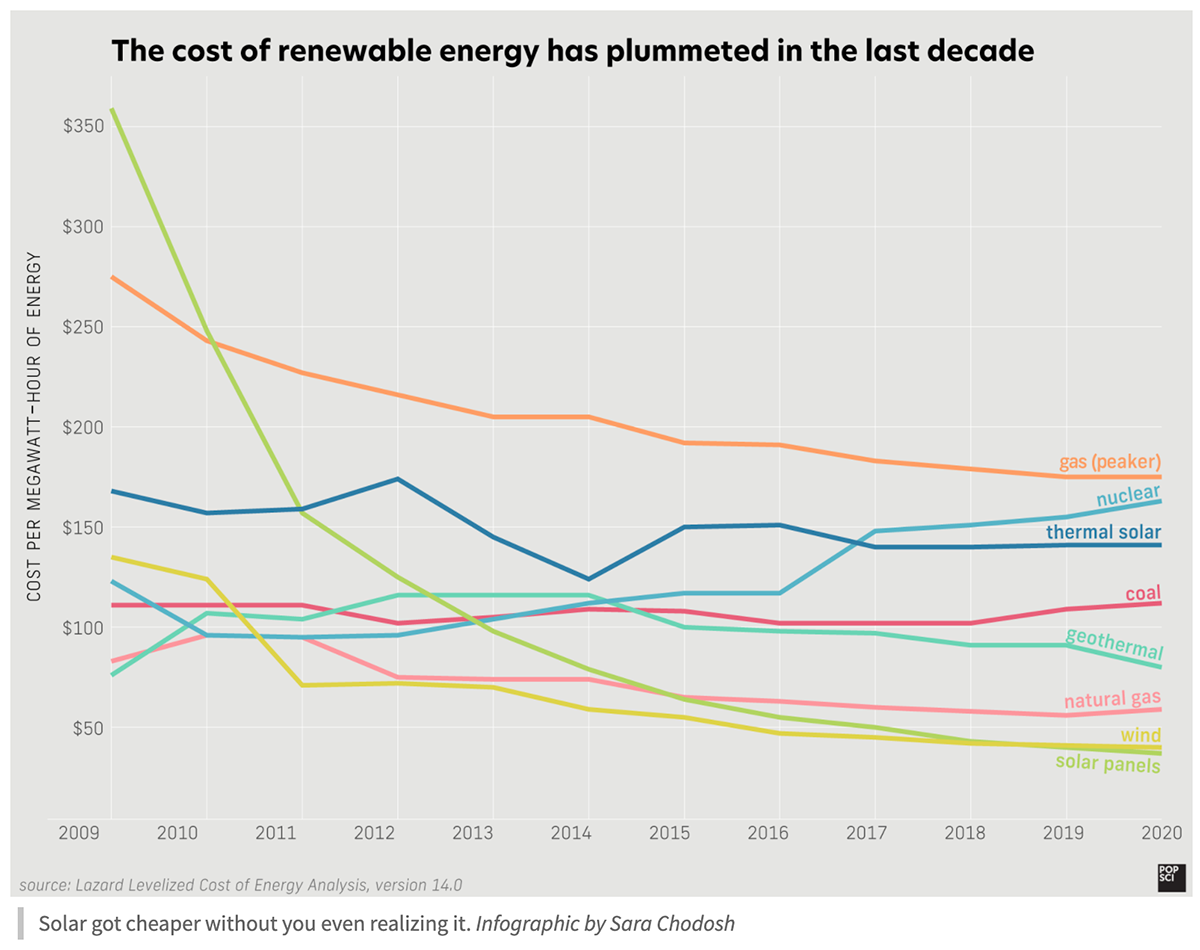
Graph source: https://www.popsci.com/story/environment/cheap-renewable-energy-vs-fossil-fuels/
A second important stipulation for the Commission is that it must develop its new clean energy plan through a stakeholder process. While the bill does not define who those stakeholders will be or how they will be selected, we expect environmental groups, representatives of the renewables industry, consumer advocates, and technical experts to be invited to the table. This stakeholder process should provide an important platform for climate justice advocates to secure the cleanest, fairest plan possible. And because the plan has to be reviewed every two years, there should be plenty of opportunities to right the ship should it veer off course.
The bill also decouples utilities’ profit motive from the quantity of energy they sell to residential customers and establishes performance-based ratemaking. According to the NC Sustainable Energy Association, this will allow the commission to create incentives and reward Duke Energy for creating programs or reaching goals that further equity or are socially beneficial in another manner. These could include enrolling more customers into their energy efficiency and demand-reduction programs or doing a better job contracting with minority-owned businesses.
HB 951 also contains an “on-bill tariff” program to help homeowners finance energy efficiency upgrades and pay back the up-front costs for equipment, materials, and installation through interest-free payments on their energy bills. This innovative program could enable more people, including lower and moderate-income households, to upgrade their boilers, heating and cooling systems, and other appliances in order to reduce their energy consumption and increase the values of their homes.
What the Bill Doesn’t Do
Just as important as what the bill does, is how this version differs from the one that emerged from the murky back rooms of Raleigh in July. That House version limited the Utility Commission’s authority to regulate Duke Energy and locked us into a fossil fuel future. It mandated that five of Duke Energy’s coal-fired units be retired but replaced not with solar or wind but with gas-fired plants, battery storage, or a mixture of the two. And it set criteria for the replacement of the remaining coal plant that could only be met by natural gas.
Under Governor Cooper and Senator Berger’s compromise bill, those decisions continue to rest in the hands of the Utility Commission, but the law incorporates a stakeholder process and removes the natural gas replacement mandate. The compromise bill also nixes a $50 billion subsidy for modular nuclear reactors and removes a cap on securitization. HB 951 now allows half of future coal retirement costs to be pooled together with other assets and repackaged into interest-bearing securities — a process that would save ratepayers money by passing the costs off to investors.
Perhaps the most troubling aspect of the original bill was a ban on the Executive Branch from considering other greenhouse gas rules. This meddling on the part of the House would have prevented the Environmental Management Commission from establishing limits on carbon and other greenhouse gas emissions. It would have also kept North Carolina out of the Regional Greenhouse Gas Initiative — a cooperative effort by 11 states from Maine to Virginia seeking to cap and reduce emissions from the power sector.
However, for all the good things accomplished in this bill and its improvements over the House version, it still comes up short for many in the environmental and climate advocacy community.
The early retirement of coal plants and the transition to clean energy will be costly. The question of who — Duke Energy’s executives and shareholders or Duke’s customers — should pay for what has been the subplot of every Utility Commission rate hike hearing for the past decade. HB 951 not only punts on that question but also fails to include protections that would ensure that low-to-moderate income customers don’t end up paying more than their fair share. The most vulnerable in our societies are most severely impacted by climate change. This bill does little to ensure that the costs associated with the transition to clean energy won’t disproportionately affect the poorest among us.
Finally, this bill will do little to challenge Duke Energy’s monopoly or curtail the energy giant from making handsome profits in North Carolina. Duke has long sought the ability to seek multi-year rate plans instead of having to go before the Utilities Commission each year. HB 951 gives them the ability to seek rate plans for up to three years, though it does cap potential rate increases to 4% for the second or third year. (For context: in May 2021, Duke Energy got permission to increase its rates for residential customers by 5.3%) And while the law opens the door to more solar and solar-plus-storage projects moving forward, it puts Duke firmly in the driver’s seat by ensuring that they maintain 55% ownership.
In Conclusion …
On balance, MountainTrue supported the compromise bill and asked our members and activists to call on the General Assembly to vote yay. It is our position that while every piece of legislation is an opportunity for action, no bill exists in a vacuum. HB 951 has its shortcomings: it’s a good climate bill but seriously lacking as a piece of climate justice legislation. Therefore, after passing HB 951, we must redouble our efforts to provide significant support for low-income energy customers — such as pressuring our legislators to pass a 2021 fiscal budget that includes the $400 million already earmarked for energy efficiency programs.
Similarly, one must consider the political context. HB 951 makes North Carolina only the second state in the Southeast to adopt enforceable climate goals. That this came forth from negotiations between a deeply divided and often Republican-controlled General Assembly and a Democratic Governor is nothing short of a miracle. Cynics might claim that corruption and collusion are behind this unlikely development. As longtime advocates on climate issues interested in movement-building, we’re hopeful that this kind of bipartisan compromise on climate is a sign of more positive things to come.
With that, we’ll leave you with some of our favorite quotes on this legislation from observers, advocates, and legislators:
Ward Lenz, Executive Director of the NC Sustainable Energy Association: “While the Senate proposed committee substitute for HB951 is not perfect, and will impact different clean energy technologies and customers in different ways, it ultimately marks an important milestone as we continue to work towards more transformational energy policies that ensure affordability and reliability for customers and deliver greater market competition.”
Andrew Hutson, Executive Director of the Audubon Society of North Carolina: “ “This bill was made better by thousands of North Carolinians who spoke up for a clean energy future. Still, the bill is by no means perfect and will require important follow-through by the Utilities Commission to deliver on its promise. There is still much work to do to address our changing climate in a way that is just and equitable. Audubon is committed to working in the coming years to make that a reality.”
NRDC in a blog post analyzing the bill: “The high-level takeaway of this legislation is that when signed into law, this legislation will make binding Governor Cooper’s Clean Energy Plan established targets of 70% reductions in power-sector carbon dioxide (CO2) emissions by 2030 and carbon neutrality by 2050. It may also signal that bipartisan progress on climate policy is possible even in conservative states.”
Governor Roy Cooper: “This bipartisan agreement sets a clean energy course for North Carolina’s future that is better for the economy, better for the environment, and better for the pocketbooks of everyday North Carolinians. I am encouraged that we have been able to reach across the aisle to find a way forward that will update our energy systems while saving people money and doing our part to slow climate change.”
Senate Leader Phil Berger: “North Carolina is a growing state, attracting businesses and families from all over. That growth depends on a stable supply of reliable and affordable energy. After months of policy negotiations, we reached an agreement that will signal to businesses and families here now or considering a move here that North Carolina’s leaders are committed to pro-growth energy policies.”
House Speaker Rep. Tim Moore, R-Cleveland: “We have a responsibility to be good stewards of our natural resources while also maintaining low costs for citizens and businesses, and this bill achieves each of those goals. It is absolutely crucial for our state and for our national security that we prioritize energy independence now.”
Senate Democratic Leader Dan Blue: “I am proud of the work put forth in this energy bill. This legislation will put our clean energy aspirations into action. We need to continue working to protect our environment, and all ratepayers, as we move North Carolina to a clean energy future.”
House Democratic Leader Rep. Robert Reives: “I support this compromise that helps build a resilient North Carolina that combats climate change, creates green jobs, and helps consumers and businesses have predictable, fair prices.”
Editorial Board of the Charlotte Observer: “All that said, North Carolinians should settle for this version of House Bill 951. The latest measure, trimmed from 49 to 10 pages, is better than the original. If the governor and Democrats were to reject it, the alliance of Republicans and Duke Energy might peel off enough Democrats to pass a veto-proof bill that’s worse. So we’ll take this half-loaf, which Cooper is expected to soon sign into law. Given the reactionary nature of the General Assembly’s leadership regarding the poor and the environment and Duke Energy’s love affair with fossil fuels, it’s unlikely that further negotiation will bring further improvement.”
Rep. Larry Pittman, R-Cabarrus, said on the House floor that the push to reduce carbon emissions was “all I need to know to oppose” the bill. “Simply a useless endeavor to solve an imaginary problem contrived by would-be socialist totalitarians.”

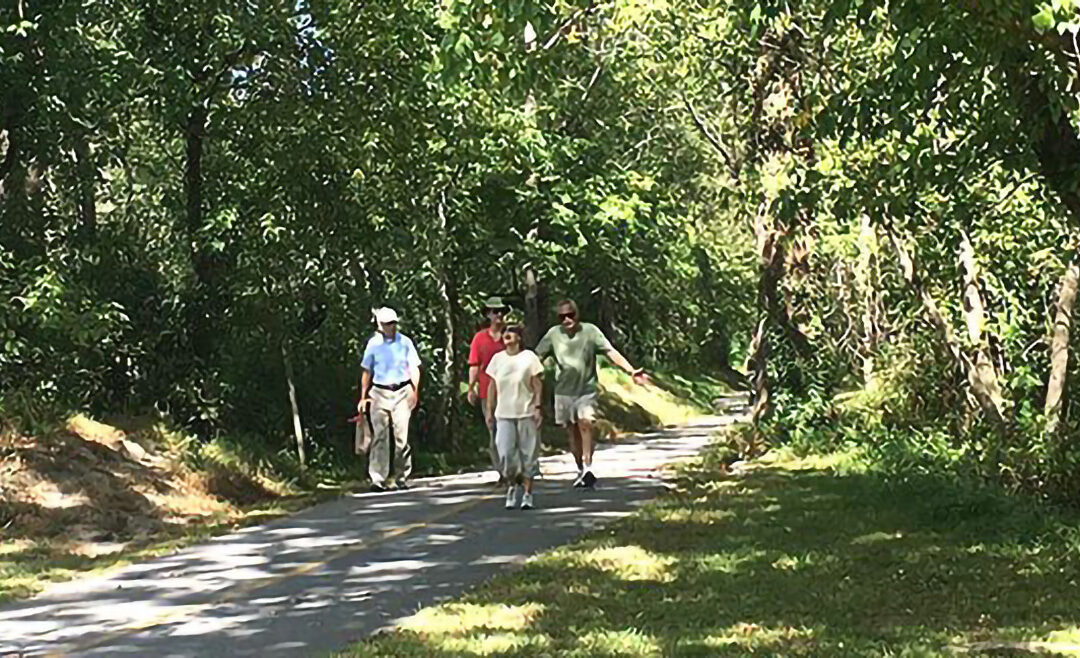





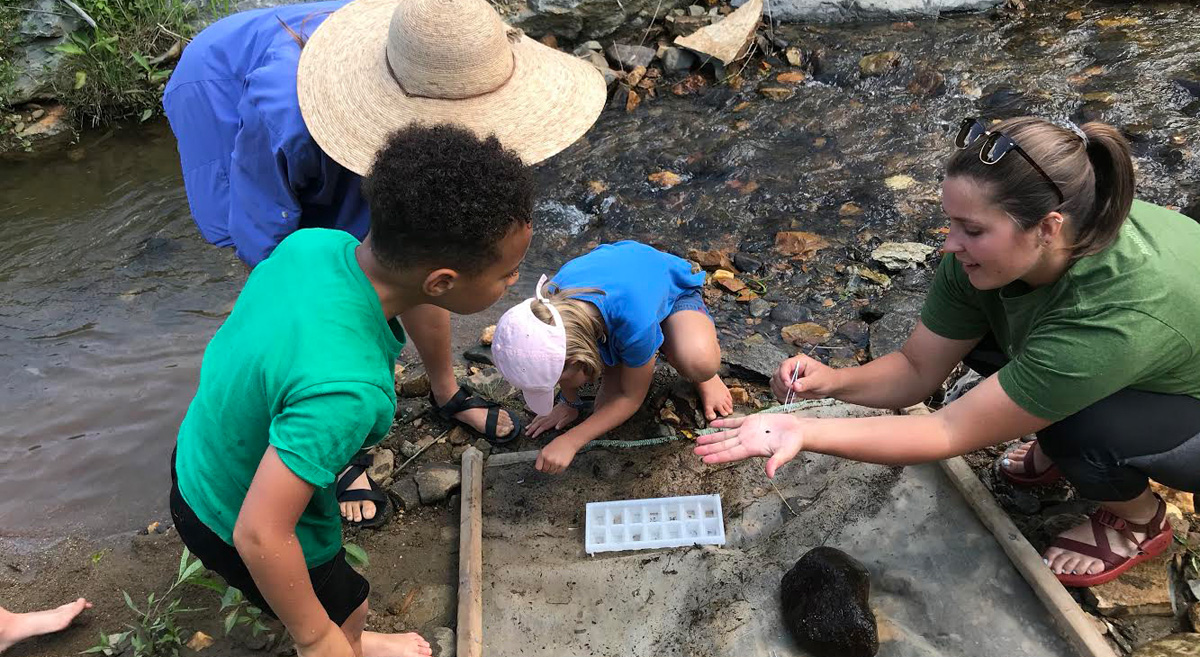
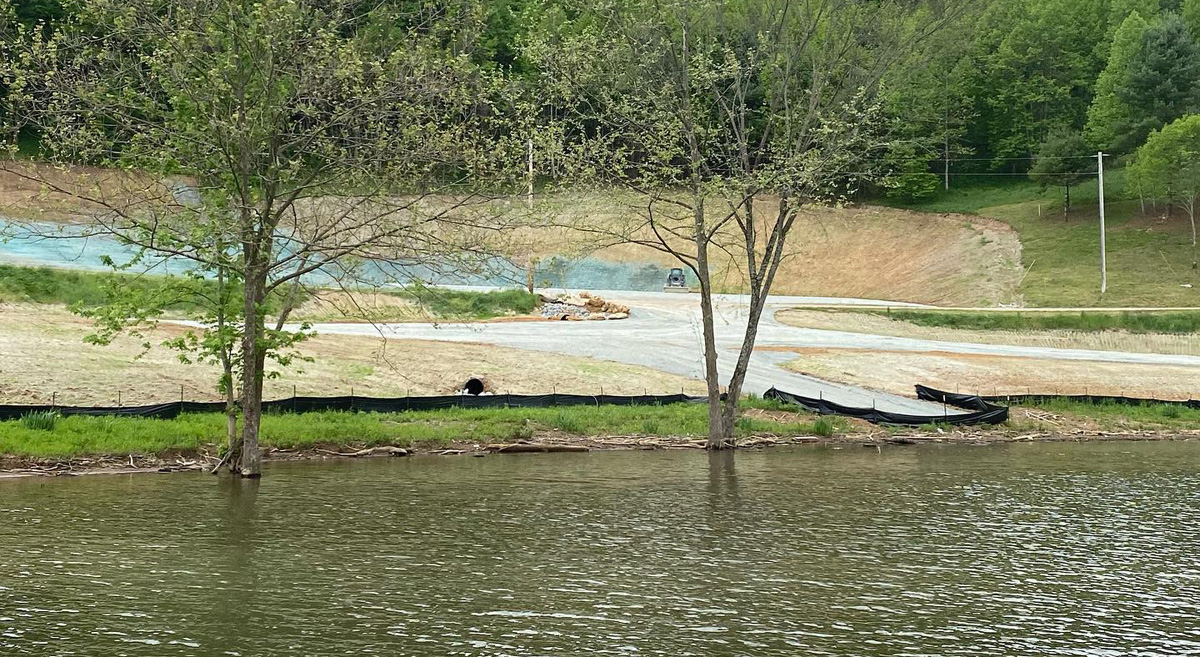
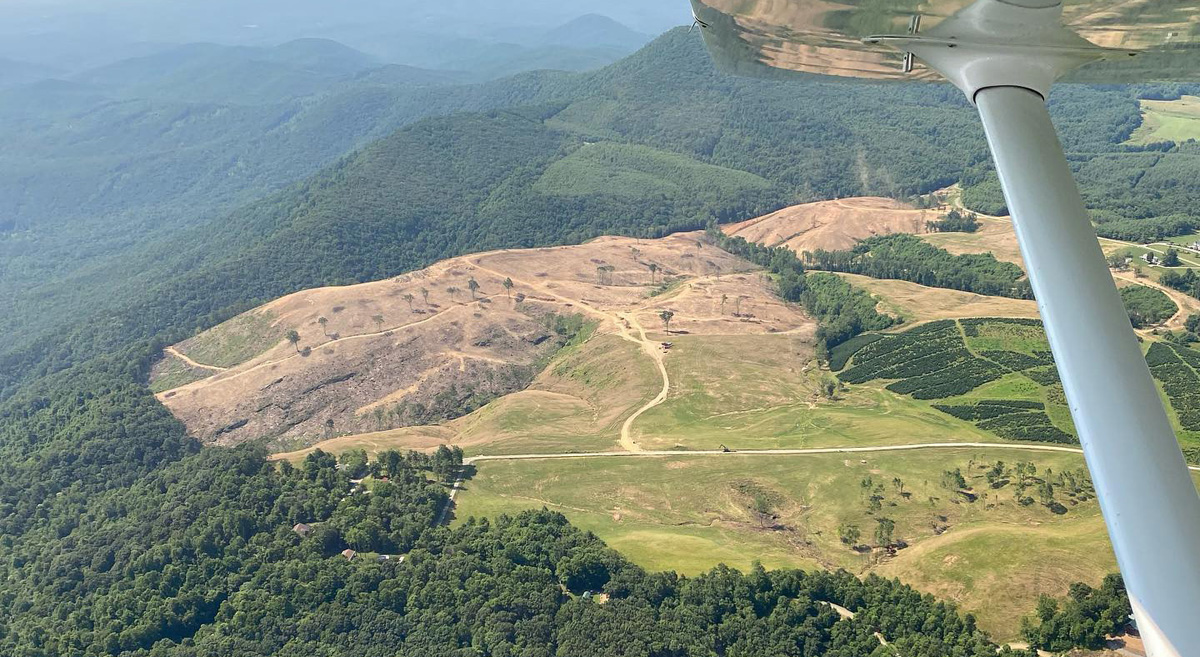

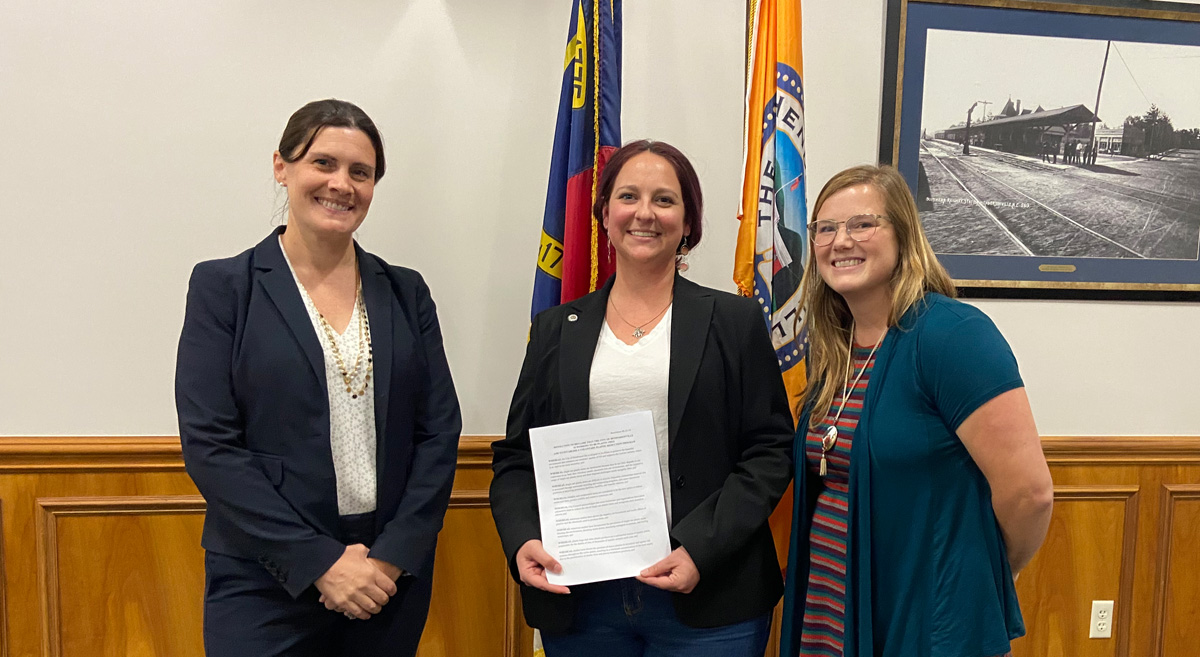
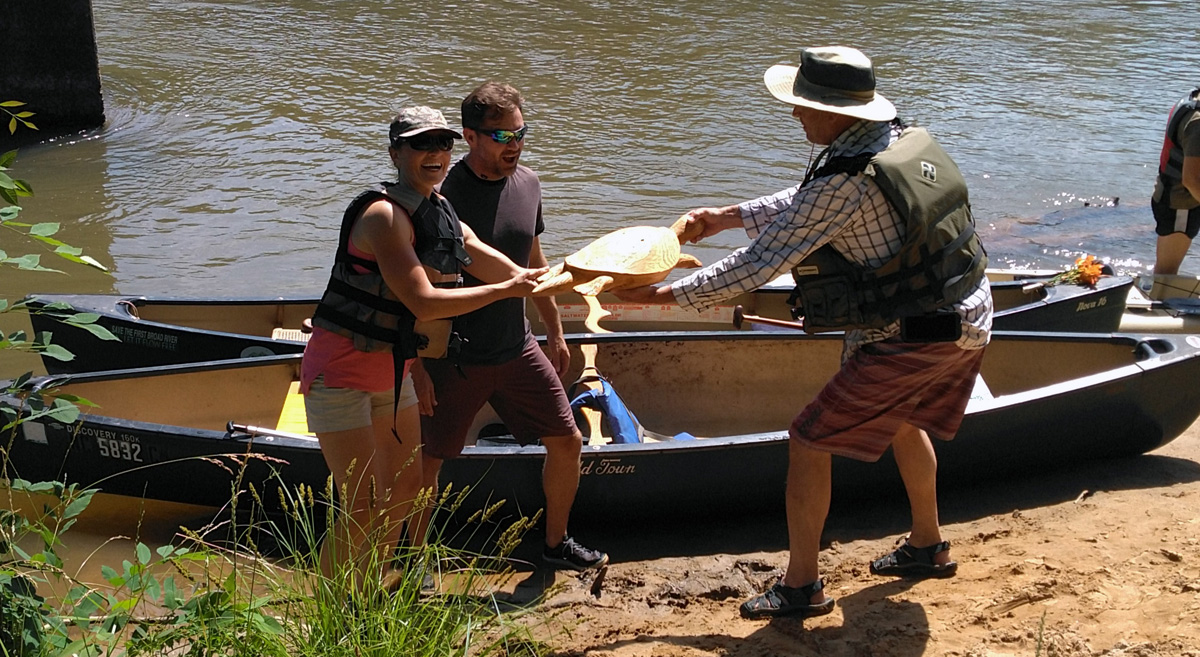 Broad River Race winners Jordan Jackson and Marc Stowe accept the trophy from David Caldwell, the Broad Riverkeeper.
Broad River Race winners Jordan Jackson and Marc Stowe accept the trophy from David Caldwell, the Broad Riverkeeper.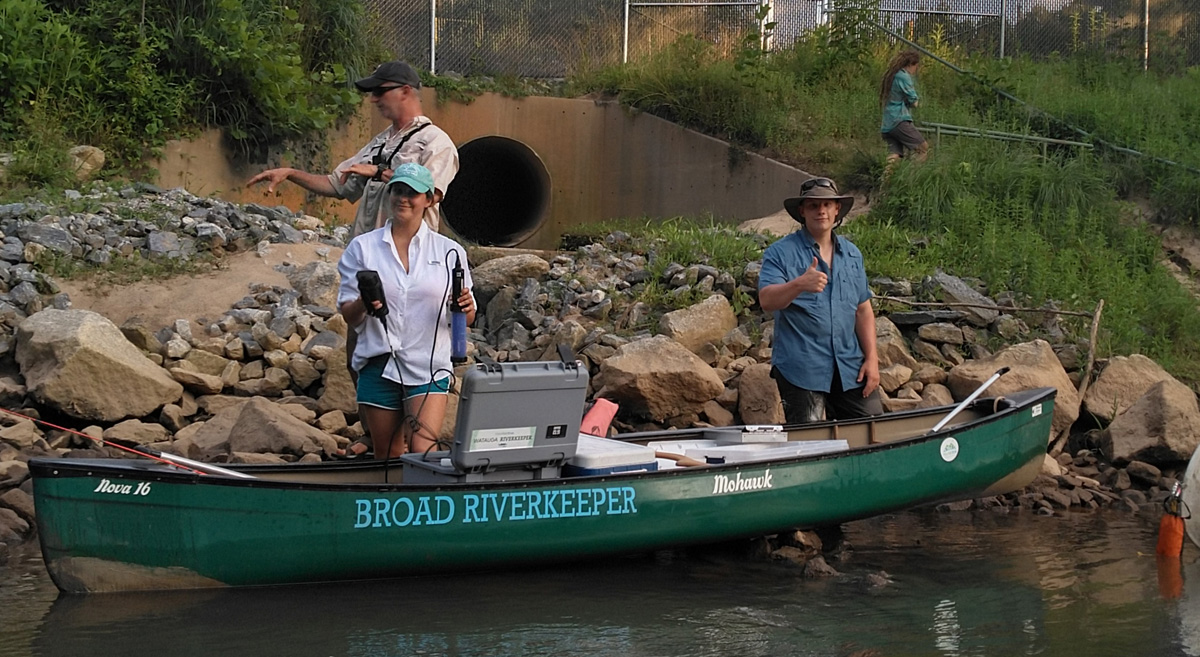
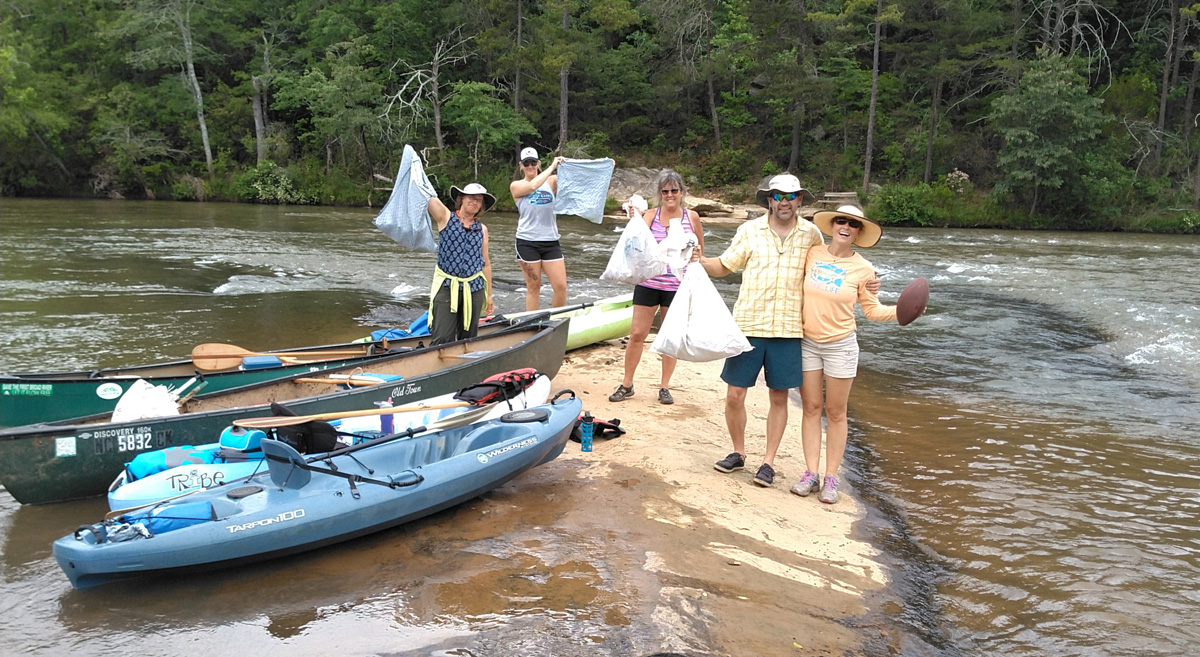
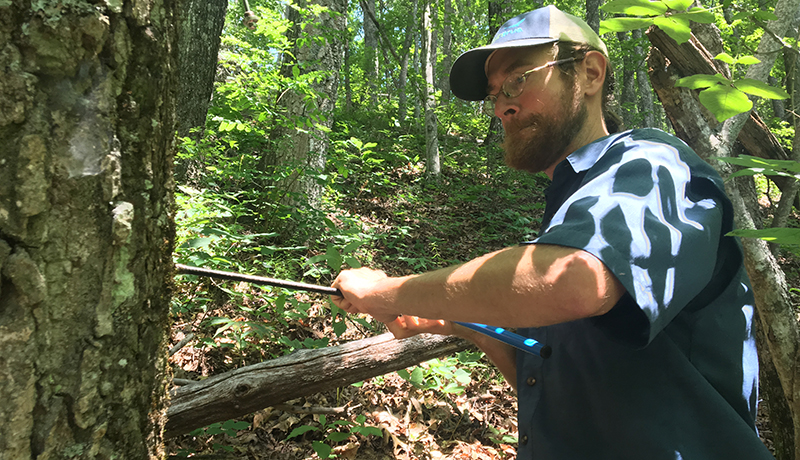 MountainTrue’s Public Lands Field Biologist Josh Kelly documents the age of a 200-year-old tree in the Nantahala National Forest.
MountainTrue’s Public Lands Field Biologist Josh Kelly documents the age of a 200-year-old tree in the Nantahala National Forest.